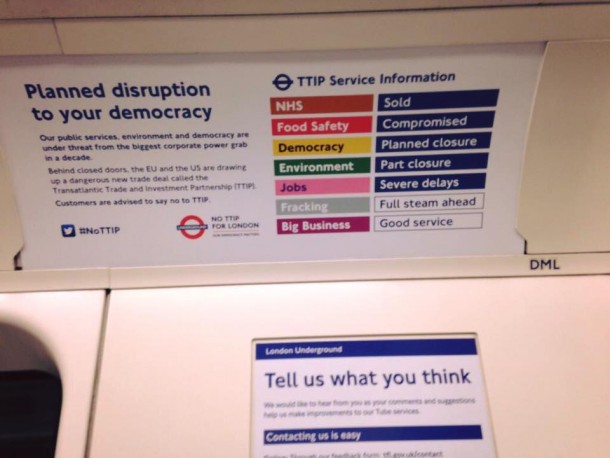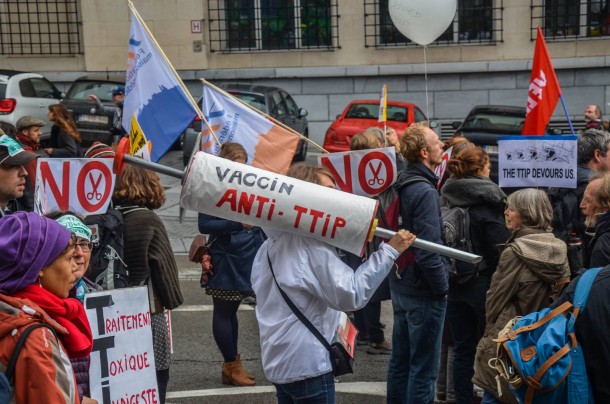The year has not yet finished, but I guess it’s time to start ranking the best quotes for 2015. As for me, I had no doubts Jean Claude Juncker’s “there can be no democratic choice against the European treaties” would achieve the first podium in my personal ranking. In front of the crowds of people voting to put an end to social, political and economic shock therapies in Greece, the head of the European Commission perfectly enshrined his deep belief in the current, profoundly anti-democratic EU decision-making process.
Things, naturally, became more complicated a few days ago. Same context, same unaccountable élite. Did you guys hear as well Trade Commissioner Cecilia Malmström saying “I do not take my mandate from the European people” ? That was the first time we ever agreed on something!
No joke. What is going on around TTIP is by far the most interesting issue since the WTO protests in Seattle in 1995. Two weeks ago, 250 thousand people gathered to demonstrate against the plans for a trade deal with the US in Berlin. Trade unions, environmental organisations, advocacy groups, farmers, workers, confederations of SMEs are combining their efforts to make their message stronger. A clear opposition to an idea of Europe where labour rights, standards on food safety, environmental legislation and public services, just to cite a few, are bargained in the name of a religious faith in free trade that only suits big business. It’s no coincidence that the Commission recently started to negotiate a draft Trade Secrets Directive with EU Member States and the Parliament to protect companies’ “trade secrets” from the work of journalists, whistle-blowers and unionists.
(By the way, did you know that Philip Morris International is suing Uruguay for health warnings on cigarette packs? And that Swedish energy giant Vattenfall sued Germany for its nuclear power phase out after the Fukushima disaster? Have you heard about oil major Lone Pipe suing Canada against the country’s decision to put a moratorium on fracking? We are talking billions of dollars. Public money, of course.)
On October 7th a petition was symbolically handed over to EC officials with more than 3 million signatures against TTIP and CETA, the trade agreement with Canada whose negotiations have been concluded last year. A spicy present for EC negotiators before the 11th round of TTIP talks in Miami. In mid-October, an intense five-day program was organised by Brussels civil society groups covering information meetings, demonstrations, examples of civic disobedience and direct actions during the EU Council summit.
Over the last year, NO-TTIP zones have been popping up like mushroom across Europe. In UK, Austria, Germany, France and Belgium there are significant numbers of regional and local TTIP-free zones. Spain is performing well too, as northern Italy. The rising local resistance tells a lot about the impact TTIP would have on the powers granted to local authorities such as planning. Even elected governments in the EU– and states in the US – are increasingly questioning the way negotiations are conducted, as well as raising doubts on specific elements included in the talks.
TTIP, what’s the deal?
The proposed Transatlantic Trade and Investment Partnership would create the world’s largest free-trade zone, encompassing some 800 million consumers. The round talks aim at finding a compromise on the harmonisation of regulations between EU and US in a wide range of areas, ranging from food and chemical safety standards, banking regulations and intellectual property rights, environmental legislation and public procurement. TTIP also includes a chapter on mechanisms for investment protection – a highly controversial issue.
Who stands behind the negotiations for a trade deal with US?
Needless to say, private interest groups overwhelmingly dominated the cycle of consultations undertook by the EC: more than 93 per cent of the EC meetings in the preparatory phase were with big business (companies and corporate lobby groups such as Business Europe). Only a few meetings were held with public interest groups. And also during negotiations, companies are massively exercising their influence.
Which issues are covered by the on-going negotiations?
The talks for a EU-US free trade area encompass virtually everything. A special exclusion from the negotiating mandate and from the TTIP chapter on services has been introduced for audio-visual services thanks to a wave of protests from authors, movie makers and actors. However, TTIP could still pose a threat to cultural diversity in Europe. The US negotiators are said to be pushing for future liberalisation of the sector. The same goes for educational services. In short, TTIP opens the door to commercialisation of public services.
What is absolutely scaring about TTIP?
The talks are conducted in deep secrecy between the Commission and Office of the U.S. Trade Representative – even our national and European elected representatives are not involved nor informed about the process, nor are US counterparts. They can only accept or reject the deal once it is finalised. And the real interest in the negotiations is not about lowering tariffs (which already low ~3 per cent) but on regulatory aspects, which vary enormously between EU and US. The precautionary principle that regulates the EU market does not exists overseas. This means that products’ safety standards are lower compared to the EU. Labour regulations are extremely different from ours. As for investment protection, big companies have already used special investor rights included in some bilateral treaties signed in the ’90s to sue states for their public policies.
The ‘regulatory cooperation’ chapter
Regulatory cooperation strongly prioritises trade and investment over the public interest. In the proposed chapter representatives of big business are given the green light to sit in ‘expert groups’ and elaborate new regulations even before discussions take place in the elected parliaments.
The Investor-State Dispute Settlement (ISDS)
This mechanism is based on an international arbitration procedure with private tribunals with no guarantee of impartiality and where only states can be sued, not investors. ISDS can also have an inhibiting effect on developing future policies. 97% of the contributions to the EC consultation over investor rights rejected ISDS. The Commission reacted with a reform package that echoes business views without altering the nature of the mechanism.
What EU is propaganda saying about the trade talks?
EC official discourse on TTIP is about the eternal mantra of increased competitiveness, growth and jobs. However, even the most optimistic projections show that TTIP would have very mitigated effects in terms of GDP growth. TTIP will only benefit big corporations, not citizens. Don’t believe the hype!



